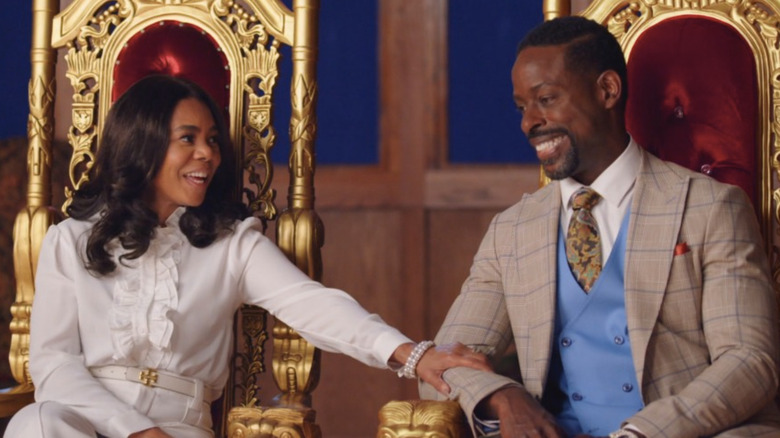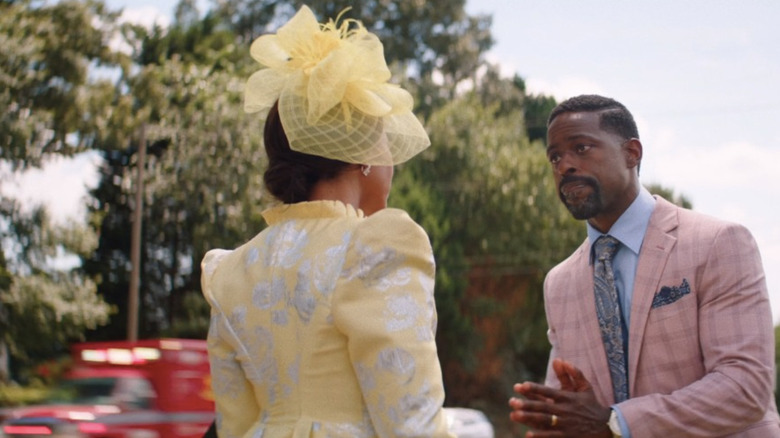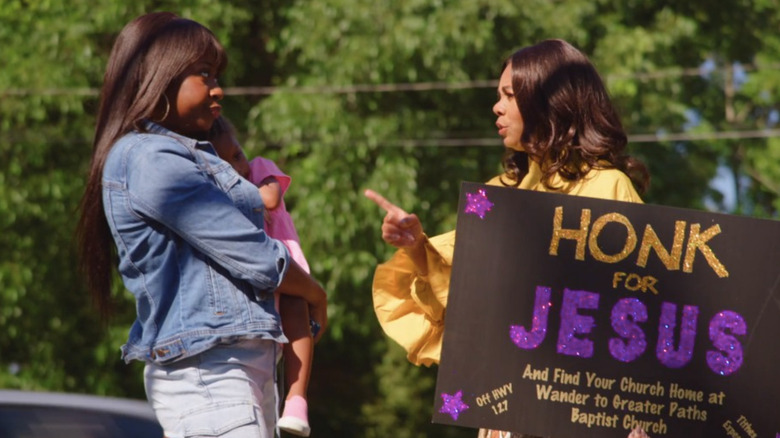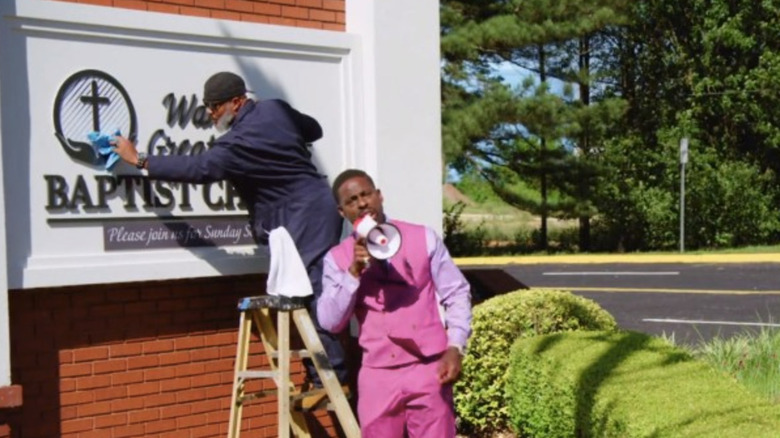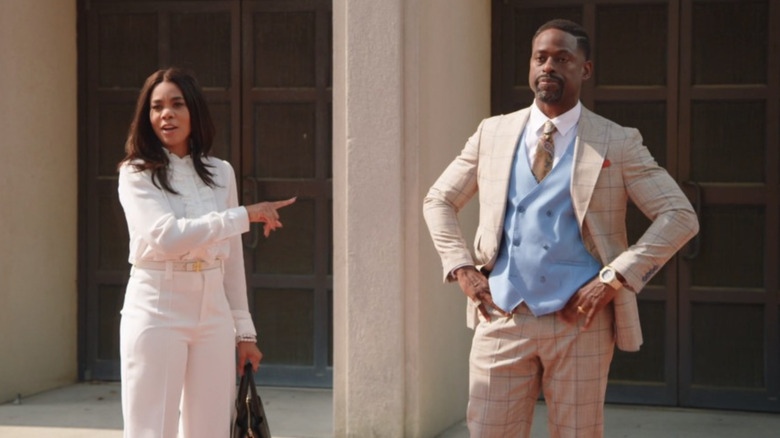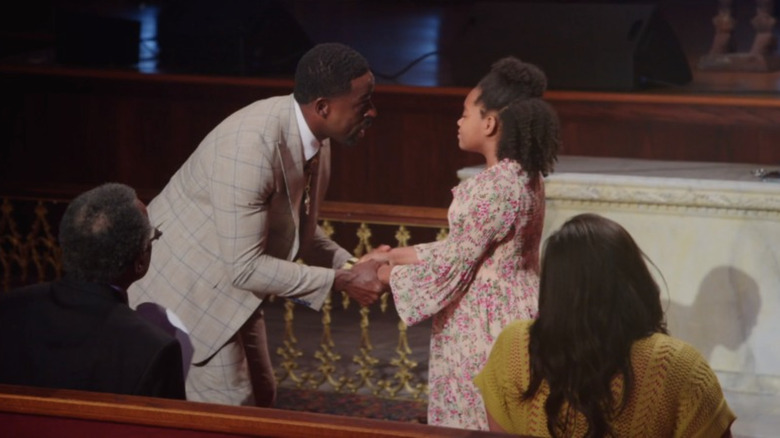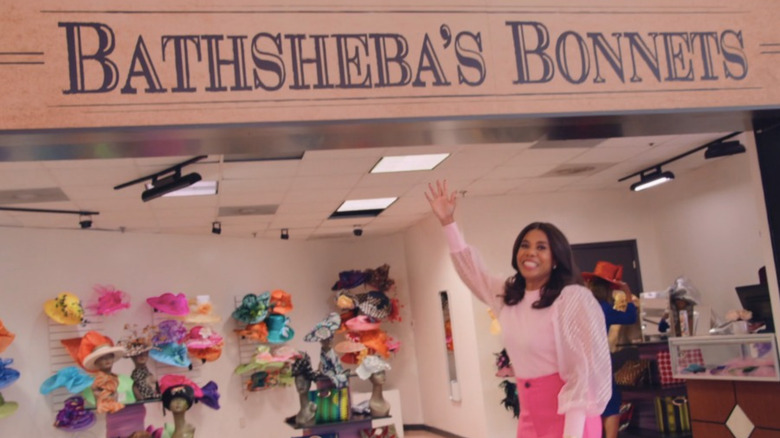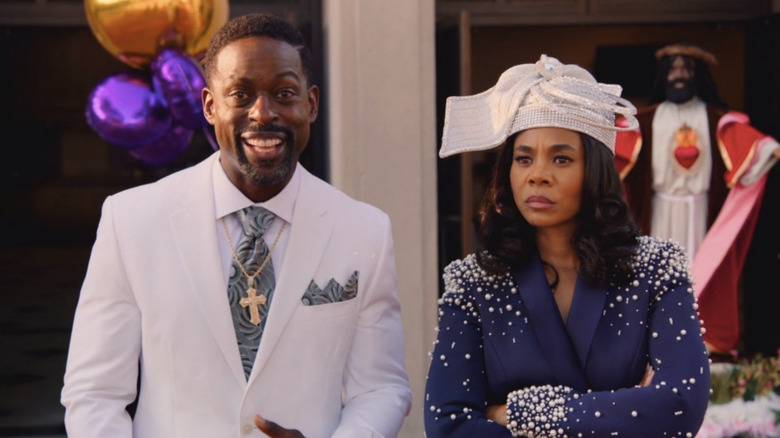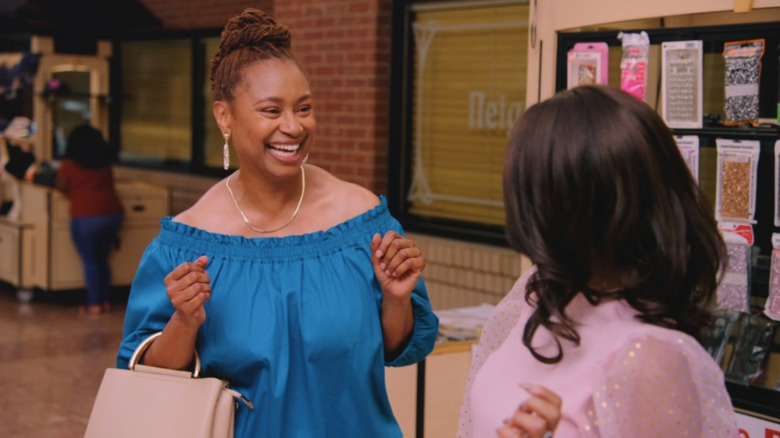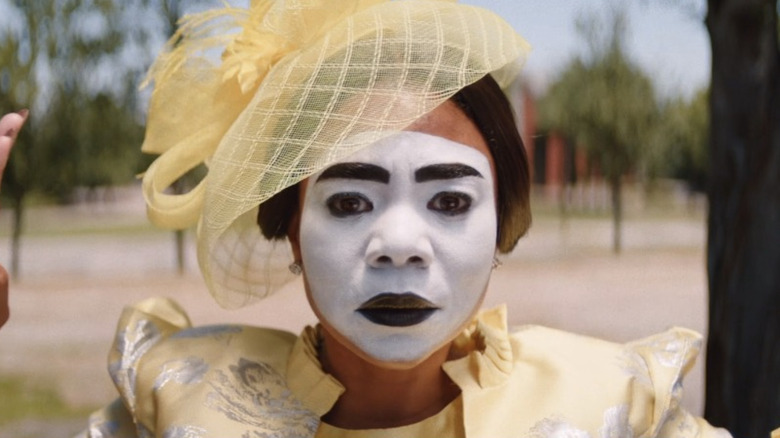Ranking The 12 Funniest Moments In Honk For Jesus. Save Your Soul
This article contains spoilers for the 2022 film "Honk For Jesus. Save Your Soul."
What if you lost everything and had one shot to renew your reputation? That's the thesis of the 2022 mockumentary "Honk For Jesus. Save Your Soul." Directed by Adamma Ebo and starring Regina Hall and Sterling K. Brown, the parody doc tells the story of married couple Trinitie and Lee-Curtis Childs, who are attempting to reopen their closed church following allegations against Lee-Curtis for inappropriate conduct.
The mockumentary toes the line delicately between comedy and drama, with its subject matter being decidedly serious. It knows when to pump the brakes on the jokes and give the potentially triggering throughline room to breathe. While the second half of the film in particular humanizes its characters and dives headfirst into the aftermath of the scandal, other parts of the film extrapolate humor from the story's larger-than-life personas. Most of the comedy comes from moments in which the characters aren't very self-aware, so consumed with reviving their own reputation that they fail to notice they're only digging themselves into a deeper hole.
From visual gags only possible in mockumentaries to religious references that may have flown over your head, we've ranked the funniest moments from "Honk For Jesus. Save Your Soul."
12. A relatable conversation for movie buffs
Every cinephile knows the feeling of being in a conversation with someone who doesn't quite have all the facts straight about a particular movie. At that moment, you have a choice: Do you let it slide and move on with the discussion, or do you get hung up on the need to correct the mistake? Lee-Curtis seemingly can't help himself from making sure Trinitie knows what she's talking about when the couple chats over breakfast.
"You married a winner and that's all I intend to do," Lee-Curtis says of their upcoming church reopening. "I'm Rocky up in this fight." Trinitie is confused. "Rocky didn't win," she remarks. Continuing, she says, "He went the distance, you know, the whole 15 rounds against Apollo Creed, but he didn't actually win." Lee-Curtis ponders her comment for a moment before retorting, "All right, but he did win in 'Rocky II.'" He asks her how many times he has to tell her the first movie was just set-up. From the look on Trinitie's face, this news seems to make no difference. It's a relatable exchange for anyone who's tried to explain an intricate plot detail of a movie — and equally relatable to the person on the other end of the conversation who couldn't care less.
11. A quick laugh in the credits
End credits shine a spotlight on the unsung heroes who contribute their creative talents to the art of filmmaking, and from the exhaustive length that most credits sequences are, it's clear that it takes a village to make a movie. Within the traditional structure of film credits, the director's name is listed twice, bookending the list by stating "Directed by [name]" at the beginning and "A film by [name]" at the end.
The filmmakers behind "Honk For Jesus. Save Your Soul." seem to find this verbiage a little bit excessive. Even if a director stewards a production's vision and helms its course, does saying a film is "by" one person belittle the involvement of hundreds of other artists? The answer to that probably depends on who you ask, but in this case, it's an opportunity for not only a joke, but legitimate gratitude. During the end credits for the movie, the screen populates with the expected phrase, "A film by the Ebo twins" before another line appears just underneath that one... "and the whole damn cast and crew."
10. I need to save souls
Lee-Curtis easily and frequently confuses the purpose of his job with that of the being he worships. Inflating his ego and appearing delusional to everyone but himself, Lee-Curtis often takes credit for anything and everything positive that happens in his church. He takes pride in the moral function of his role, saying in particular that he "saves people."
While a prominent part of the Christian faith is the act of accepting Jesus as a savior, thus being "saved," as the lingo goes, this step in one's spiritual journey is something most Christians would attribute to Jesus himself, not their pastor. Lee-Curtis doesn't seem to have gotten the memo on this aspect of the faith he preaches. During a heated argument with Trinitie as they stand on the side of the road, Lee-Curtis insists he's the key to all of this. "Are you really gonna be the barrier that keeps me from saving souls?" he shouts at his wife. "I need this. I need to save souls." He's immediately put in his place as a wailing emergency vehicle drives by, presumably filled with people en route to save some souls in a more literal sense, though Lee-Curtis is too consumed in the conversation to notice the irony.
9. An f-bomb with a blessing
Trinitie is very much aware that she has an image to uphold as she untangles a web of complicated emotions toward Lee-Curtis' scandal. She wrestles with her feelings for her husband and her responsibilities as the self-appointed "first lady" of the church, and at the center of it all is a public image that she believes she has to maintain, regardless of how she feels. Every now and then, though, Trinitie understandably snaps.
As Trinitie stands on a sidewalk and shouts at passersby to invite them to church, one woman strolling by has a thing or two to say about Lee-Curtis' scandal. She shouts in Trinitie's face, yelling f-bombs as Trinitie asks her to stop. When the woman stomps away, continuing to scream f-bombs, Trinitie unwinds and throws it right back at her. "F*** you!" she screams, with the might of someone who wanted to say that a lot earlier. She then clocks herself and reconsiders, timidly following her curse with a seemingly sincere "God bless."
8. The Sumpters
Nicole Beharie and Conphidance play Shakura and Keon Sumpter, pastors of an up-and-coming church in the same town as Trinitie and Lee-Curtis Childs' church. The two couples clearly don't like each other and consider their respective venues as rivals, but their profession keeps them from being crass. Instead, they always communicate about one another in comical backhanded compliments.
Trouble brews when Trinitie and Lee-Curtis learn that Shakura and Keon plan to launch a new church location on Easter Sunday, the same day that they planned to reopen their church following Lee-Curtis' scandal. Fearing that more people will prefer newer, younger pastors rather than his older, disgraced self, Lee-Curtis moves his reopening forward by two weeks. Fearing that more people will prefer Lee-Curtis' established, born-again persona rather than their untested, inexperienced selves, Shakura and Keon move their reopening two weeks up... so both churches end up opening on the same day again.
The mockumentary crew captures Shakura and Keon's reactions to this news as congregants pour into their church on opening day. They're clearly thrown off and unsettled by the information, but again know they have to save face. "We wish them nothing but the best and pray that they flourish and keep it together," Shakura says. Keon continues, "But just in case the devil is too big of a beast to wrestle and they ever feel the need to step back again," his and Shakura's church "will be right there to pick everybody up."
7. Shake it for the Lord
"Honk For Jesus. Save Your Soul." earns its name from a plan Lee-Curtis devises to spread the word about his and Trinitie's church reopening. They'll stand on the side of the road just outside the church, twirling signs and waving at passing cars in the hope that they'll attract returning churchgoers and new visitors alike to the grand reopening.
They're still fine-tuning their approach the first time they step outside for an advertising session. Lee-Curtis gives Trinitie some feedback on her tactics. "You're gonna have to move a little more. Give them a show! Shake it for the Lord!" Just behind Lee-Curtis, the man cleaning the church sign turns his head incredulously at what he just heard the pastor say. A pop zoom on the man accentuates the humor of the moment in true mockumentary style. Lee-Curtis breaks into an impromptu song with his megaphone as Trinitie starts dancing, hoping to gain some more honks.
6. Flipping tables energy
As Trinitie and Lee-Curtis prepare to give the documentary crew a tour of their church, Lee-Curtis accidentally steps on some gum on the walkway outside. He immediately goes into an outburst, scraping his foot along the pavement and complaining that he's wearing Fiano shoes as he tries to no avail to wipe the gum off.
Remembering that cameras just captured the incident, Lee-Curtis asks if the crew can edit around that moment. "Excuse my unholy language back there," he apologizes. Trinitie comforts him. "Yes, I would have gotten mad at that, too," she says. "Even Jesus lost it in the temple that day. It was probably gum in the temple, too!" She refers to the passage in the Bible in which Jesus, upset that vendors are selling wares in the temple courts, flips over the merchants' tables.
This is just the beginning of Trinitie and Lee-Curtis' ongoing relationship with the camera crew. This scene is hardly the couple's last flub in front of the filmmakers, and they never quite figure out how to keep it cool in unexpected moments of crisis.
5. Wednesday service
Many churches hold services on Wednesday nights that tend to be a bit more casual than Sunday mornings. That's certainly one way to phrase what happens at Trinitie and Lee-Curtis' church as they film a Wednesday service for the documentary crew.
The only people in attendance are five individuals who Trinitie and Lee-Curtis call "the old reliables," adamantly loyal to the church despite the recent scandal. It's hard to tell what's being hammed up for the camera and what is simply another Wednesday, but the proceedings are memorable to say the least. Lee-Curtis removes his shirt mid-prayer. Flashing lights accompany the service despite there being only five people present. Trinitie re-baptizes Lee-Curtis, who happily shouts that he is "saved again." To top it all off, Lee-Curtis seemingly casts demons out of a young girl in attendance. The mockumentary format then cuts to an interview with the girl, who says earnestly, "I love the theater."
4. Bathsheba's Bonnets
Many of the women in Trinitie and Lee-Curtis' church wear elaborate hats that match their meticulously composed outfits. Trinitie's favorite place to buy her hats is Bathsheba's Bonnets, a store comically named after a woman in the Bible. According to scripture, King David was so attracted to Bathsheba that he committed adultery with her. Bathsheba ultimately became one of David's wives and had children with him.
The irony of such a suggestive biblical figure being the namesake of a store that sells upscale hats to attract the attention of others is a marvelously subtle joke. Within the context of the film, the name is simply shown on the store's entrance sign rather than made into a punchline. It doesn't demand that the audience laugh at the store name or even notice its meaning. The alliterative name itself sounds somewhat amusing even to the viewer who makes no connection to what it references. It's even funnier if the background is understood.
3. They're here for me
In Lee-Curtis' eyes, he's done nothing wrong. Even in the wake of his allegations, his rhetoric stands firm upon his actions being the work of a tempting devil rather than something he did of his own accord. Now, following a period of reflection and restoration, he's ready to be back in his pulpit preaching to the thousands of people who attend his church. They'll surely all return, there's no doubt about that. They can plainly see that he's a changed man, and anything the media said about what happened were merely allegations anyway, not facts. The public is on his side. They'll welcome him back with open arms... right? Right?
Well, it turns out that's not the case, though nothing can convince Lee-Curtis otherwise. On reopening day, he and Trinitie stand outside the church to greet guests, but no one shows up. Still, Lee-Curtis is convinced that at any moment, cars will come pouring into the parking lot. He nearly gets a glimmer of hope. A lone car enters the church grounds, and Lee-Curtis praises himself for attracting even one visitor. "They're here for me. They're here for Pastor Lee-Curtis Childs, yes, they are. Yes, they are." No sooner does Lee-Curtis make this proclamation than the car immediately screeches into gear, does a few donuts in the parking lot, and then drives away.
2. Trinitie encounters Denetta
Trinitie and Lee-Curtis had a big congregation before Lee-Curtis' scandal, and closing their doors meant that church attendance was left in the balance for a lot of people. While naturally many have moved on to other houses of worship in the interim, Trinitie hopes that they'll prepare to come back as she and Lee-Curtis make plans to reopen.
At the mall, Trinitie runs into a woman named Denetta, who the documentary crew labels as "Congregant." The tension between the two of them is palpable, as Denetta clearly has no intention of returning to Trinitie's church, but maintains a polite facade all the same. The two women laugh through gritted teeth at each other's jokes, their eyes all but revealing their true disdain for each other.
By the end of Trinitie and Denetta's passive-aggressive encounter, Denetta's title has changed to "Former Congregant." It's a superb moment that leverages the mockumentary technique for a joke only possible in this format. "You have a blessed one," Denetta says, concluding the conversation and promptly walking away before Trinitie can even finish her next sentence. "You have a blessed..." Trinitie trails off before looking downtrodden toward the floor. Remembering the documentary crews are filming her, she quickly looks up, stares straight into the camera, and smiles as if her run-in with Denetta was simply delightful.
1. Praise miming
Praise miming is exactly what it sounds like: Worshiping God by painting one's face like a mime and performing mutely. Lee-Curtis loves it. Trinitie can't stand it. When their "honk for Jesus" campaign on the side of the road fails to attract the attention they hoped for, Lee-Curtis declares that it's miming time. Resistant, but committed to her husband's wishes, Trinitie paints her face and mimes on the sidewalk (Lee-Curtis, of course, doesn't do any miming at all and his face remains clean).
Mimes are inherently comedic, so even as the moment seems dead serious to the characters, it plays as funny to the audience, driven by Regina Hall giving her all as Trinitie pantomimes to worship music without a hint of irony. This is her moment, and it's glorious.
The humor of the situation, though, quickly spirals into perhaps the most raw moment of the film. Trinitie has had enough of her husband's belligerence. Refusing to let herself be subject to his humiliations any longer but unwilling to leave his side, Trinitie unpacks months of trauma in a single monologue that encompasses the betrayal she feels as Lee-Curtis' partner contrasted with the duty she feels as a pastor's wife. Noticing that Trinitie still has the mime makeup on her face, the audience realizes that at some point within the last few minutes, they stopped laughing. It's a stoic scene that gets to the core of the film and leaves viewers with the same questions Trinitie grapples with.


